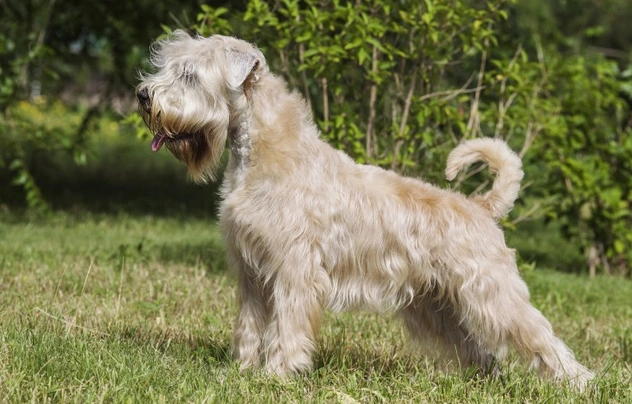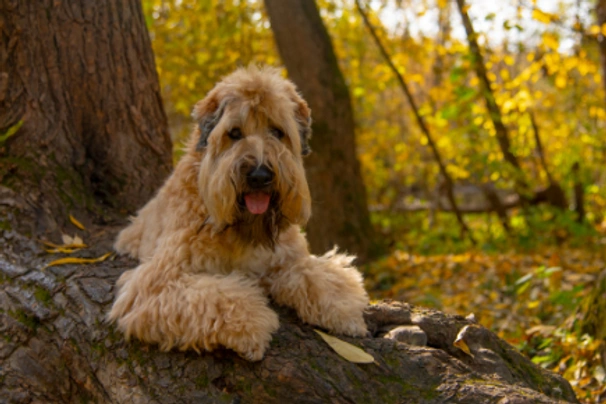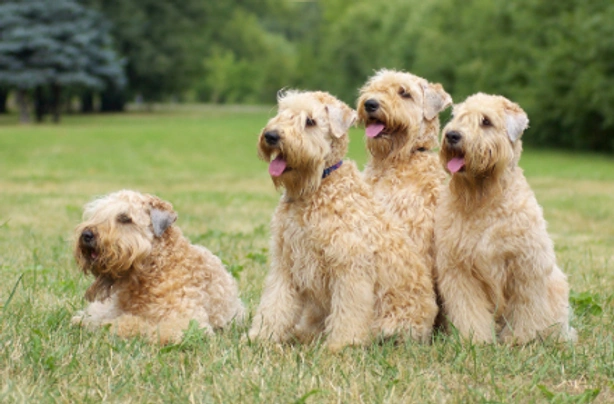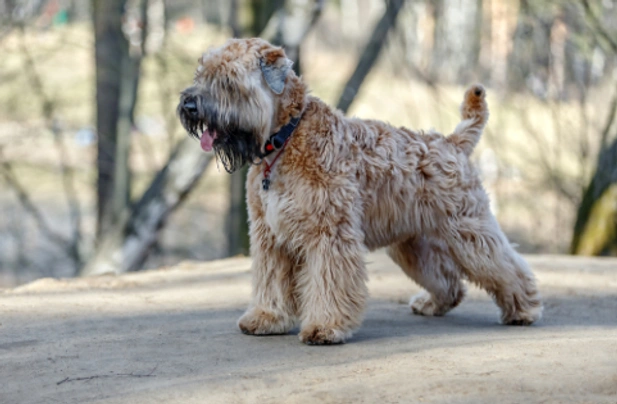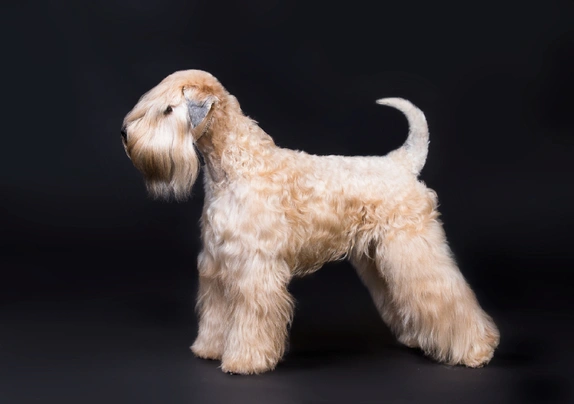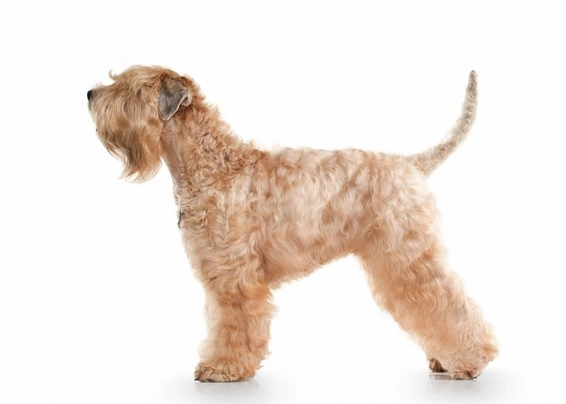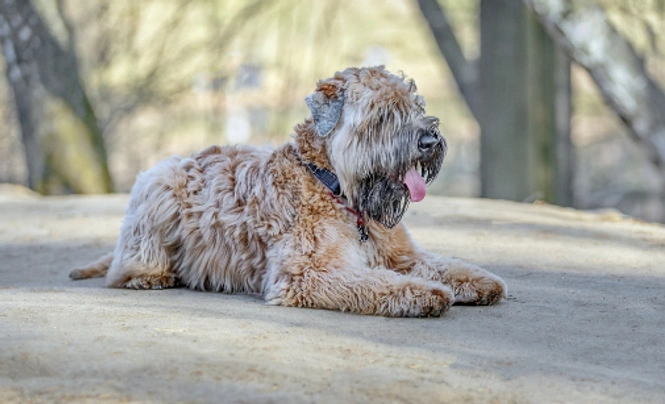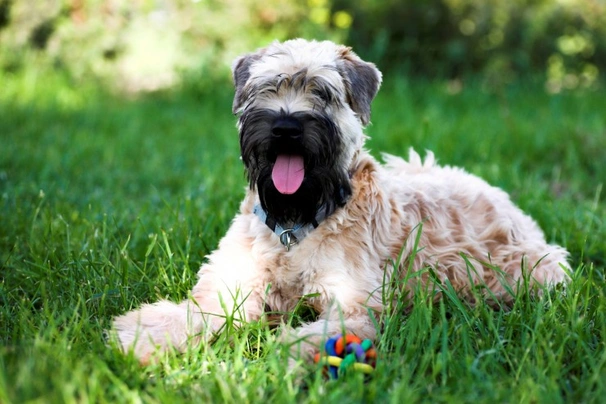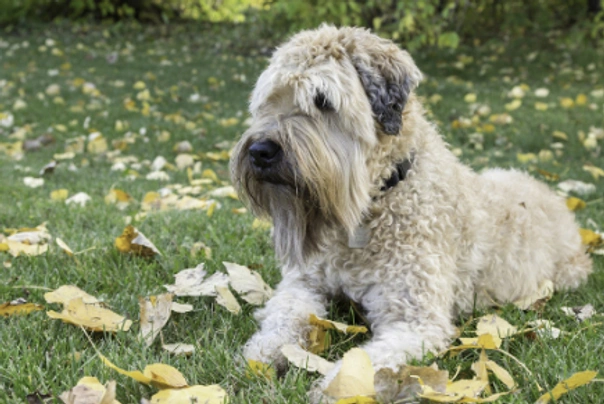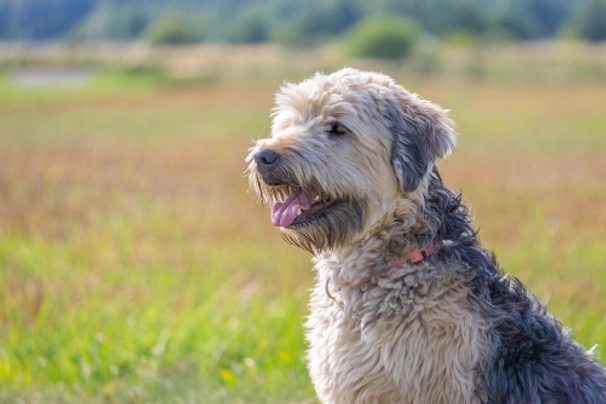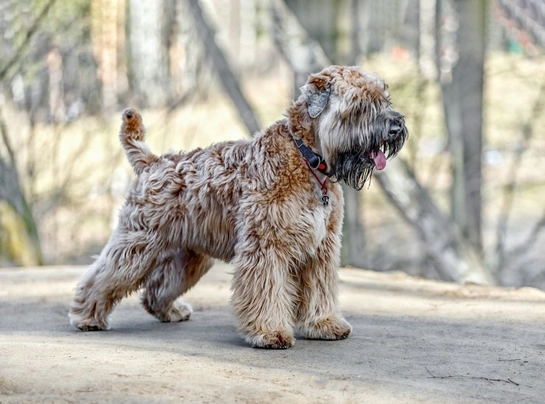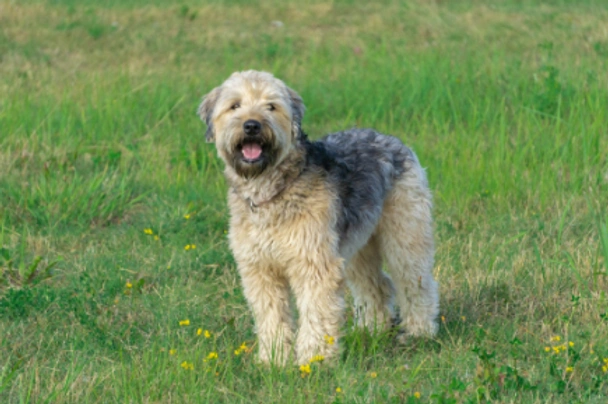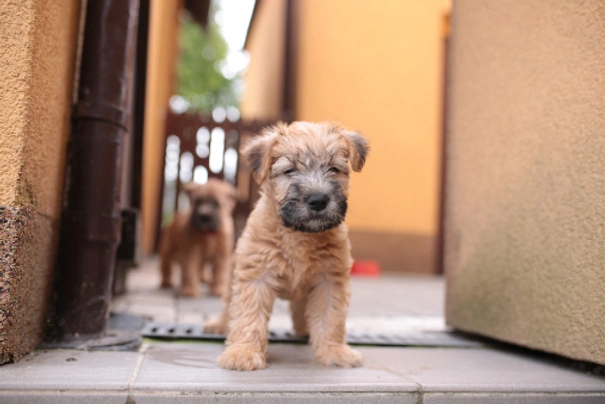Soft Coated Wheaten Terrier
Pros
Cons
Introduction of the Soft Coated Wheaten Terrier
The Soft Coated Wheaten Terrier originates from Ireland where they were originally bred to hunt vermin and guard farms and crofts in what can only be described as often harsh and spartan environments. As a result these little terriers were hardy and robust which are traits they have passed on the terriers we see today.
Soft Coated Wheatens are happy fun-loving terriers and they make wonderful family pets because they thrive on being around people and in a home environment. They may be high maintenance in the grooming department but the effort is well worth it because Wheaties are so much fun to have around thanks to the fact they remain so “puppy-like” throughout their lives loving nothing more than to entertain and be entertained.
History of the Soft Coated Wheaten Terrier
It's thought that the Soft Coated Wheaten Terrier first appeared on the scene in Ireland around 200 years ago. They were bred to work on farms and considered to be a "poor man's dog”. They had to do many jobs around a farm which included hunting guarding and herding livestock all of which were tasks these terriers proved themselves to be very good at becoming highly prized “ratters”. They are thought to be one of Ireland's oldest terrier breeds although their true origins remain a bit of a mystery.
For a long time these farm terriers were allowed to breed quite freely and it was not until the 1930's that breed standards were established by the Irish Kennel Club and which at the time included four terrier breeds. There is some thought that Wheaten Terriers could well be one of the founding breeds for another Irish dog namely the Kerry Blue Terrier. These charming little terriers were finally recognised as a breed in the own right by The Kennel Club in 1943 and over the years they have earned themselves the reputation for being trustworthy reliable and affectionate dogs that make great family pets and companions.
Interesting facts about the breed
- Is the Soft Coated Wheaten Terrier a vulnerable breed? No they are one of the more popular terrier breeds in the UK
- Wheaties are not as "scrappy" as many other terrier breeds
- They were once thought of as a "poor man's dog" in their native Ireland
- A Soft Coated Wheaten Terrier called "Krista" competed against Retrievers in a dive and swim competition and almost beat them
- Dogs are born with dark coats which get lighter as puppies mature
- Wheaties were often depicted in Victorian paintings by Frederic William Burton
- Traditionally a Soft Coated Wheaten Terrier's tail was always docked but since the law banning the procedure came into effect in 2007 tail docking is now illegal with the exception being for some working breeds and if a dog suffers from some sort of health issue that requires their tails to be docked. The procedure must be agreed and authorised before being performed by a qualified vet
Appearance of the Soft Coated Wheaten Terrier
Height at the withers: Males 45 - 50 cm Females 43 - 46 cm
Average weight: Males 14 - 20 kg Females 14 - 16 kg
Soft Coated Wheaten Terriers are compact medium sized dogs that boast a charming look about them thanks to their lovely curly or wavy wheat coloured coats. They have quite flat heads with an abundance of hair that falls forward so it covers a dog's eyes. They have a well-defined stop with a nice level topline to their muzzles. Noses are large and black in colour which adds to the large appearance of a dog's head. They have clear medium sized eyes which are set nicely under a pronounced brow. Eye colour is a lovely bright dark hazel which blends in well with the colour of their coat.
Their ears are V-shaped and small to medium in size being covered in hair. They fold over with the front edge slightly dropping forward so it lies close to a dog's cheeks. The Wheatie has a strong jaw with a perfect scissor bite where their upper teeth neatly overlap their lower ones. Necks are strong and moderately long merging nicely into a dog's shoulders. Their shoulders are well-laid back being long muscular and sloping inwards. Front legs are well-muscled perfectly straight showing a good amount of bone and their chests are relatively deep.
The Wheatie has a compact robust body with short powerful loins and their backs are strong level with dogs having well-sprung ribs. Hindquarters are muscular and strong with well developed powerful back legs. Their feet are compact and strong with nice firm pads and black toenails. Their tails are set high which dogs carry gaily with some Wheaties having a slight curve in their tails which is acceptable as a breed standard.
When it comes to their coat the Soft Coated Wheaten Terrier has a silky soft coat that can either be wavy or curly. However it the hair is curly the curls are light loose and large. Their coat falls naturally and is more profuse on a dog's head and legs. Their adult coat only fully grows through when a Wheatie is around 24 months old. The accepted breed colours for Kennel Club registration are as follows:
- Blonde
- Brown
- Wheaten
Gait/movement
When a Soft Coated Wheaten Terrier moves they do so with a lively graceful and free moving gait covering a lot of ground when they do. They take long low well-coordinated strides showing a good reach both in their forequarters and hindquarters. Dogs carry their heads and tails high while keeping their backs nice and level.
Faults
The Kennel Club frowns on any exaggerations or departures from the breed standard and would judge the faults on how much they affect a dog's overall health and wellbeing as well as their ability to perform.
Males should have both testicles fully descended into their scrotums and it is worth noting that a dog can be a little lighter or heavier as well as slightly taller or shorter than set out in the Kennel Club breed standard which is given as a guideline only.
Temperament of the Soft Coated Wheaten Terrier
The Soft Coated Wheaten is what is known as a "natural" terrier and one that boasts being a strong minded albeit small dog. With this said they are known to be even-tempered and fun-loving outgoing confident characters that boast a great sense of humour. They are extremely intelligent and like nothing more than to please which means in the right hands and environment a Wheatie learns new things very quickly. The downside being they learn bad habits and behaviours just as fast as they learn the "good" ones.
They form strong bonds with one person which is typically the member of a family who takes care and feeds them. However they always show affection and loyalty to everyone in a household. They are a good choice for first time owners providing they have enough time to dedicated to their canine companion bearing in mind that a Wheatie's socialisation and training must start as early as possible and it must be consistent throughout their lives to get the best out of these terriers.
Keeping a Wheatie's coat looking as good as it should takes a lot of time and effort. On top of this they need to be professionally groomed several times a year which can be a little expensive. They are a good choice for families where one person usually stays at home when everyone else is out of the house because these little terriers thrive on human contact and do not do well if they are left on their own for longer periods of time. If they are left alone a Wheatie can quickly get bored and this can lead to a dog developing unwanted destructive behaviours around the house. They may also suffer from separation anxiety if left on their own for too long.
Are they a good choice for first time owners?
Wheaties are the perfect choice for first time dog owners because they are so amenable and people-oriented loving nothing more than to please and to entertain their families. They are particularly good with young children and older people too although playtime can get a bit boisterous at times.
What about prey drive?
Wheaties have strong hunting instincts which is deeply embedded in their psyche. As such they have a high prey drive and will happily chase anything that moves or tries to run away although it would be fair to say that this trait is not as strong as it was in days long past. However care should always be taken as to where and when a Wheatie can run off the lead more especially if there are wild animals or livestock close by.
What about playfulness?
Wheatens are fun-loving by nature and thrive on playing interactive games whenever they can. Dogs remain extremely playful well into their senior years which is another reason they are so much fun to share a home with.
What about adaptability?
The Wheaten is highly adaptable and providing they are given lots of daily physical exercise combined with a ton of mental stimulation they are just as happy living in an apartment in town as they would be living in a house in the country.
What about separation anxiety?
Soft Coated Wheatens form strong ties with their families and some dogs are never very happy when they find themselves left on their own for longer periods of time. They are better suited to people who either work from home or in households where one person stays at home when everyone else is out so they are never alone for any length of time which could see a dog suffering from separation anxiety. This can lead to them being destructive around the home which is a dog's way of relieving any stress they are feeling and a way to keep themselves entertained which could include incessant barking.
What about excessive barking?
Some Wheatens like the sound of their own voices a little too much which is something that needs to be gently nipped in the bud when a dog is still young being careful not to frighten them. Others will only bark when there are strangers about or when something they don't like is going on in their surroundings but rarely would a Wheatie do so aggressively.
Do Soft Coated Wheaten Terriers like water?
Most Wheaties love swimming and will take to the water whenever they can more especially when the weather is hot. However if anyone who owns a dog that does not like water should never force them to go in because it would just end up scaring them. With this said care should always be taken when walking a Wheaten off the lead anywhere near more dangerous watercourses just in case a dog decides to leap in and then needs rescuing because they cannot get out of the water on their own.
Are Soft Coated Wheaten Terriers good watchdogs?
A Wheaten is a good watchdog and will always bark to announce that there are strangers about or to alert an owner of something they don't like in their environment. With this said rarely would a Wheaten show any sort of aggression preferring to keep their distance until they get to know someone and then they can be all over them.
Intelligence / Trainability of the Soft Coated Wheaten Terrier
Wheaties are intelligent little dogs and they learn new things very quickly but this means they can learn both the good and the bad. They can be a little stubborn at times and because they have an independent streak in them they can be a little harder to train than other dogs. As such it takes a bit of patience and understanding to train one of these intelligent high energy dogs. The key is to keep a Wheatie as focused as possible and not to make a training session too long because they do so much better when they are given shorter training sessions more often especially when still young.
They are sensitive terriers by nature and as such they do not answer well to any sort of harsh correction or heavier handed training methods. They do respond extremely well to positive reinforcement which always brings the best out of these lovely little dogs. It's essential for Wheatie puppies to be well socialised from a young enough age for them to grow up to be well-behaved and happy mature dogs. This must involve introducing a puppy to lots of new situations noises people other animals and dogs once they've been fully vaccinated.
Wheatie puppies are incredibly cute and they are extremely clever too. As such puppies learn new things very quickly which includes the good and the bad. They are very inquisitive and lively when young which can see them jump up with delight whenever they can so they can "kiss" their owners. Although this might be acceptable behaviour for immediate "family" it might not go down so well with strangers. As such puppies need to be gently taught what is acceptable behaviour and what is not being extra careful not to scare them. The first commands a Wheaten puppy should be taught are as follows:
- Come
- Sit
- Stay
- Heel
- Quiet
- Leave it
- Down
- Bed
Children and other
Sort Coated Wheaten Terriers thrive on being in a home environment and they really come into their own when they are around children. They revel in playtime and love nothing more than a bit of rough and tumble with the kids. However as with any other dog it's best for any interaction between children and their pet to be well supervised by an adult to ensure nothing gets too boisterous which is especially true where toddlers and younger children are concerned.
When well socialised from a young age Wheaties are known to get on with other dogs and unlike many other terrier breeds they are not as "scrappy” being a lot more gregarious by nature. If they have grown up with a family cat in a household they usually get on well together but a Wheatie would think nothing of chasing off any other cat they come across. Care should be taken when they are anywhere near any smaller animals and pets because of their high prey drive.
Health of the Soft Coated Wheaten Terrier
The average life expectancy of a Soft Coated Wheaten Terrier is between 12 and 15 years when properly cared for and fed an appropriate good quality diet to suit their ages.
The Wheatie is known to be a healthy robust little terrier. However they are known to suffer from a few health issues which are worth knowing about which are as follows:
- Progressive retinal atrophy (PRA) - test available through the Kennel Club
- Cataracts - secondary to PRA
- Retinal dysplasia (retinal folds) - puppies should be tested at around 6 to 8 weeks old
- Renal dysplasia (RD) - test available
- Protein-losing Enteropathyphy (PLE) - Test available
- Protein-losing Nephropathy (PLN) - Test available
- Congenital deafness - dogs should be BAER tested through the Animal Health Trust (AHT)
- Hip dysplasia - Breeders should have stud dogs hip scored
- Microphthalmia (rbp 4) - DNA Test Available
- Skin allergies
- Atopy - a hypersensitivity to pollen
- Lymphangiectasia
- Various types of cancers
- Addison’s disease
What about vaccinations?
Wheatie puppies would have been given their initial vaccinations before being sold but it is up to their new owners to make sure they have their follow-up shots in a timely manner with the vaccination schedule for puppies being as follows:
- 10 -12 weeks old bearing in mind that a puppy would not have full protection straight away but would be fully protected 2 weeks after they have had their second vaccination
There has been a lot of discussion about the need for dogs to have boosters. As such it's best to talk to a vet before making a final decision on whether a dog should continue to have annual vaccinations which are known as boosters.
What about spaying and neutering?
A lot of vets these days recommend waiting until dogs are slightly older before spaying and neutering them which means they are more mature before undergoing the procedures. As such they advise neutering males and spaying females when they are between the ages of 6 to 9 months old and sometimes even when a dog is 12 months old.
Other vets recommend spaying and neutering dogs when they are 6 months old but never any earlier unless for medical reasons. With this said many breeds are different and it is always advisable to discuss things with a vet and then follow their advice on when a dog should be spayed or neutered.
What about obesity problems?
Some Wheaties gain weight after they have been spayed or neutered and it's important to keep an eye on a dog's waistline just in case they do. If a dog starts to put on weight it's important to adjust their daily calorie intake and to up the amount of exercise they are given. Older dogs too are more prone to gaining weight and again it's essential they be fed and exercised accordingly because obesity can shorten a dog's life by several years. The reason being that it puts a lot of extra strain on a dog's internal organs including the heart which could prove fatal.
What about allergies?
Wheaties are prone to suffering from allergies and it's important for a dog to see a vet sooner rather than later if one flares up bearing in mind that the breed is known to be predisposed to skin issues. Allergies can be notoriously hard to clear up and finding the triggers can be challenging. With this said a vet would be able to make a dog with an allergy more comfortable while they try to find out the triggers which could include the following:
- Certain dog foods that contain high levels of grains and other cereal fillers
- Airborne pollens
- Dust mites
- Environment
- Flea and tick bites
- Chemicals found in everyday household cleaning products
Participating in health schemes
All responsible Soft Coated Wheaten Terrier breeders would ensure that their stud dogs are tested for known hereditary and congenital health issues known to affect the breed by using the following schemes:
- BVA/KC Hip Dysplasia Scheme
- Breed Club - Kidney function test
- BVA/KC/ISDS Eye Scheme
- Retinal dysplasia (retinal folds) - puppies should be tested at around 6 to 8 weeks old
- Protein-losing Enteropathyphy (PLE)
- Protein-losing Nephropathy (PLN)
- Eye testing
What about breed specific breeding restrictions?
Apart from the standard breeding restrictions for all Kennel Club registered breeds there are no other breed specific breeding restrictions for the Soft Coated Wheaten Terrier.
What about Assured Breeder Requirements?
The Kennel Club strongly recommends that all breeders included KC Assured Breeders use the following schemes on their breeding stock:
- BVA/KC Hip Dysplasia Scheme
- Breed Club - Kidney function test
- Eye testing
Caring for the Soft Coated Wheaten Terrier
As with any other breed Wheaties need to be groomed on a regular basis to make sure their coats and skin are kept in top condition. They also need to be given regular daily exercise to ensure they remain fit and healthy. On top of this dogs need to be fed good quality food that meets all their nutritional needs throughout their lives.
Caring for a Soft Coated Wheaten Terrier puppy
Soft Coated Wheaten puppies are boisterous and full of life which means it's essential for homes and gardens to be puppy-proofed well in advance of their arrival. A responsible breeder would have well socialised their puppies which always leads to more outgoing confident and friendly dogs right from the word go. With this said any puppy is going to feel vulnerable when they leave their mother and littermates which must be taken into account. The longer a puppy can remain with their mother the better although it should never be for too long either.
It's best to pick a puppy up when people are going to be around for the first week or so which is the time needed for a puppy to settle in. Puppy-proofing the home and garden means putting away any tools and other implements that a boisterous puppy might injure themselves on. Electric wires and cables must be put out of their reach because puppies love chewing on things. Toxic plants should be removed from flowerbeds and the home too.
Puppies need to sleep a lot to grow and develop as they should which means setting up a quiet area that's not too out of the way means they can retreat to it when they want to nap and it's important not to disturb them when they are sleeping. It's also a good idea to keep "playtime" nice and calm inside the house and to have a more active "playtime" outside in the garden which means puppies quickly learn to be less boisterous when they are inside.
The documentation a breeder provides for a puppy must have all the details of their worming date and the product used as well as the information relating to their microchip. It is essential for puppies to be wormed again keeping to a schedule which is as follows:
- Puppies should be wormed at 6 months old
- They need to be wormed again when they are 8 months old
- Puppies should be wormed when they are 10 months old
- They need to be wormed when they are 12 months old
Things you'll need for your puppy
There are certain items that new owners need to already have in the home prior to bringing a new puppy home. It's often a good idea to restrict how much space a puppy plays in more especially when you can't keep an eye on what they get up to bearing in mind that puppies are often quite boisterous which means investing in puppy gates or a large enough playpen that allows a puppy the room to express themselves while keeping them safe too. The items needed are therefore as follows:
- Good quality puppy or baby gates to fit on doors
- A good well-made playpen that's large enough for a puppy to play in so they can really express themselves as puppies like to do
- Lots of well-made toys which must include good quality chews suitable for puppies to gnaw on bearing in mind that a puppy will start teething anything from when they are 3 to 8 months old
- Good quality feed and water bowls which ideally should be ceramic rather than plastic or metal
- A grooming glove
- A slicker brush or soft bristle brush
- Dog specific toothpaste and a toothbrush
- Scissors with rounded ends
- Nail clippers
- Puppy shampoo and conditioner which must be specifically formulated for use on dogs
- A well-made dog collar or harness
- A couple of strong dog leads
- A well-made dog bed that's not too small or too big
- A well-made dog crate for use in the car and in the home that's large enough for a puppy to move around in
- Baby blankets to put in your puppy's crate and in their beds for when they want to nap or go to sleep at night
Keeping the noise down
All puppies are sensitive to noise including Soft Coated Wheaten Terrier puppies. It's important to keep the noise levels down when a new puppy arrives in the home. TVs and music should not be played too loud which could end up stressing a small puppy out.
Keeping vet appointments
As previously mentioned Wheaten puppies would have been given their first vaccinations by the breeders but they must have their follow up shots which is up to their new owners to organise. The vaccination schedule for puppies is as follows:
- 10 -12 weeks old bearing in mind that a puppy would not have full protection straight away but would only be fully protected 2 weeks after they have had their second vaccination
When it comes to boosters it's best to discuss these with a vet because there is a lot of debate about whether a dog really needs them after a certain time. However if a dog ever needed to go into kennels their vaccinations would need to be fully up to date.
What about older Soft Coated Wheaten Terriers when they reach their senior years?
Older Soft Coated Wheatens need lots of special care because as they reach their golden years they are more at risk of developing certain health concerns. Physically a dog's muzzle may start to go grey but there will be other noticeable changes too which includes the following:
- Coats become coarser
- A loss of muscle tone
- Wheatens can either become overweight or underweight
- They have reduced strength and stamina
- Older dogs have difficulty regulating their body temperature
- They often develop arthritis
- Immune systems do not work as efficiently as they once did which means dogs are more susceptible to infections
Older dogs change mentally too which means their response time tends to be slower as such they develop the following:
- They respond less to external stimuli due to impaired vision or hearing
- They tend to be a little pickier about their food
- They have a lower pain threshold
- Become intolerant of any change
- Often an older dog can feel disorientated
Living with a Soft Coated Wheaten Terrier in their golden years means taking on a few more responsibilities but these are easily managed and should include taking a look at their diet the amount of exercise they are given how often their dog beds need changing and keeping an eye on the condition of their teeth.
Older Soft Coated Wheatens need to be fed a good quality diet that meets their needs at this stage of their lives all the while keeping a close eye on a dog's weight. A rough feeding guide for older dogs is as follows bearing in mind they should be fed highly digestible food that does not contain any additives:
- Protein content should be anything from 14 – 21%
- Fat content should be less than 10%
- Fibre content should be less than 4%
- Calcium content should be 0.5 – 0.8%
- Phosphorous content should be 0.4 – 0.7%
- Sodium content should be 0.2 – 0.4%
Older Wheatens don't need to be given the same amount of daily exercise as a younger dog but they still need the right amount of physical activity to maintain muscle tone and to prevent a dog from putting on too much weight. All dogs need access to fresh clean water and this is especially true of older dogs when they reach their golden years because they are more at risk of developing kidney disorders.
Grooming of the Soft Coated Wheaten Terrier
A Wheatie's coat is moderately long and is made up of silky slightly wavy hair which is longer on a dog’s face. Although they don’t shed they are high maintenance in the grooming department. Ideally a Wheatie's coat needs to be brushed daily to remove any debris they may have picked up and to prevent any knots or tangles from forming. Particular attention should be paid to a dog's muzzle which needs wiping with a soft damp cloth after a Wheatie has eaten.
They also need to be professionally groomed several times a year to keep their coats in good condition bearing in mind that their grooming needs are higher when they are younger and before their adult coats grow through. It's also important to check a dog's ears on a regular basis and to clean them when necessary. If too much wax builds up in a dog's ears it can lead to a painful infection which can be hard to clear up. In short prevention is often easier than cure when it comes to ear infections.
Exercise of the Soft Coated Wheaten Terrier
Wheaties are energetic intelligent little terriers and as such they need to be given the right amount of daily exercise and mental stimulation for them to be truly happy well balanced dogs. If they are not given enough to occupy their minds and enough outdoor time these little dogs can become unruly and wilful. They are best suited to families who live in the country and who lead more active outdoor lives because although small a Wheatie needs to have lots of room to express themselves. They need to be given at least 60 minutes exercise a day and more if possible to keep them from getting bored. If a Wheatie does get bored it could lead to dogs developing all sorts of behavioural issues which includes excessive barking and being destructive around the home.
A shorter walk in the morning would be fine but a longer more interesting one in the afternoon is a must. These dogs also like to be able to roam around a back garden as often as possible so they can really let off steam. However the fencing must be extremely secure to keep these energetic inquisitive dogs in because if they find a weakness in the fence they will soon escape out and get into all sorts of trouble.
With this said Wheatie puppies should not be over exercised because their joints and bones are still growing. This includes not letting a dog jump up and down from furniture or going up or down the stairs. Too much pressure placed on their joints and spines at an early age could result in a dog developing serious problems later in their lives.
Feeding of the Soft Coated Wheaten Terrier
If you get a Wheatie puppy from a breeder they would give you a feeding schedule and it's important to stick to the same routine feeding the same puppy food to avoid any tummy upsets. You can change a puppy's diet but this needs to be done very gradually always making sure they don't develop any digestive upsets and if they do it's best to put them back on their original diet and to discuss things with the vet before attempting to change it again.
Older dogs are not known to be fussy or finicky eaters but this does not mean you can feed them a lower quality diet. It's best to feed a mature dog twice a day once in the morning and then again in the evening making sure it's good quality food that meets all their nutritional requirements. It's also important that dogs be given the right amount of exercise so they burn off any excess calories or they might gain too much weight which can lead to all sorts of health issues. Obesity can shorten a dog's life by several years so it's important to keep an eye on their waistline from the word go.
Feeding guide for a Soft Coated Wheaten Terrier puppy
Puppies need to be fed a highly nutritious good quality diet for them to develop and grow as they should. As a rough guide a Wheaten puppy can be fed the following amounts every day making sure their meals are evenly spread out throughout the day and it's best to feed them 3 or 4 times a day:
- 2 months old - 181g to 232g depending on puppy's build
- 3 months old - 213g to 283g depending on puppy's build
- 4 months old - 229g to 316g depending on puppy's build
- 5 months old - 233g to 318g depending on puppy's build
- 6 months old - 233g to 284g depending on puppy's build
- 8 months old - 157g to 226g depending on puppy's build
- 10 months old - 139g to 222g depending on puppy's build
Once a puppy is 12 months old they can be fed adult dog food.
Feeding guide for an adult Soft Coated Wheaten Terrier
Once fully mature an adult dog must be fed a good quality diet to ensure their continued good health. As a rough guide an adult Soft Coated Wheaten Terrier can be fed the following amounts every day:
- Dogs weighing 14 kg can be fed 178g to 235g depending on activity
- Dogs weighing 16 kg can be fed 197g to 259g depending on activity
- Dogs weighing 20 kg can be fed 233g to 307g depending on activity
Soft Coated Wheaten Terrier price
If you are looking to buy a Soft Coated Wheaten Terrier you would need to register your interest with breeders and agree to being put on a waiting list because very few puppies are bred and registered with The Kennel Club every year. You would need to anything from £150 to over £300 for a well-bred pedigree puppy. The cost of insuring a male 3-year-old Soft Coated Wheaten Terrier in northern England would be £19.89 a month for basic cover but for a lifetime policy this would set you back £412.98 a month (quote as of December 2017). When insurance companies calculate a pet's premium they factor in several things which includes where you live in the UK a dog's age and whether they have been neutered or spayed among other things.
When it comes to food costs you need to buy the best quality food whether wet or dry making sure it suits the different stages of a dog’s life. This would set you back between £30 - £40 a month. On top of this you need to factor in veterinary costs if you want to share your home with a Soft Coated Wheaten Terrier and this includes their initial vaccinations their annual boosters the cost of neutering or spaying a dog when the time is right and their yearly health checks all of which quickly adds up to over £900 a year.
As a rough guide the average cost to keep and care for a Soft Coated Wheaten Terrier would be between £60 to £90 a month depending on the level of insurance cover you opt to buy for your dog but this does not include the initial cost of buying a well-bred healthy Kennel Club registered pedigree Soft Coated Wheaten Terrier puppy.
Buying advice
When visiting and buying any puppy or dog there are many important things to consider and questions to ask of the breeder/seller. You can read our generic puppy/dog advice here which includes making sure you see the puppy with its mother and to verify that the dog has been wormed and microchipped.
Soft Coated Wheaten Terriers are among some of the more popular terrier breeds both in the UK and elsewhere in the world which means that well-bred puppies can often command a lot of money. As such with Soft Coated Wheatens there is specific advice questions and protocols to follow when buying a puppy which are as follows:
- Beware of online scams and how to avoid them. You may see online and other adverts by scammers showing images of beautiful Soft Coated Wheaten Terrierpuppies for sale at very low prices. However the sellers ask buyers for money up front before agreeing to deliver a puppy to a new home. Potential buyers should never buy a puppy unseen and should never pay a deposit or any other money online to a seller. You should always visit the pet at the sellers home to confirm they are genuine and make a note of their address.
- As previously touched upon Soft Coated Wheaten Terriers are among some of the most popular terrier breeds in the UK. As such there are many amateur breeders/people who breed from a dam far too often so they can make a quick profit without caring for the welfare of the puppies their dam or the breed in general. Under Kennel Club rules a dam can only produce 4 litters and she must be between a certain age to do so. Anyone wishing to buy a Soft Coated Wheaten puppy should think very carefully about who they purchase their puppy from and should always ask to see the relevant paperwork pertaining to a puppy's lineage their vaccinations and their microchipping.
